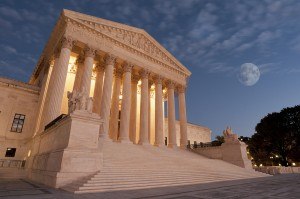

The U.S. Supreme Court on Wednesday ruled in favor of Comcast Corp. in a case over how much it charged a group of cable TV subscribers, the latest blow against consumers hoping to pursue class action lawsuits.
In a 5-4 decision, the court said 2 million subscribers in the Philadelphia area could not sue Comcast as a group.
These subscribers claimed in an antitrust lawsuit that the largest U.S. cable TV company overcharged them as part of an effort to monopolize the market.
But Justice Antonin Scalia wrote for the majority that the subscribers fell “far short” of establishing that damages could be accurately measured for the entire group.
He said the proposed class was too diverse in the claims they raised and in where they lived, causing individual damages calculations to “overwhelm” issues common to everyone.
Wednesday’s decision overturned an August 2011 ruling by the 3rd U.S. Circuit Court of Appeals in Comcast’s hometown of Philadelphia, which had allowed the class action to go forward.
It came nearly two years after the Supreme Court’s landmark ruling in Wal-Mart Stores Inc. v. Dukes, which threw out a giant gender discrimination lawsuit because the employees had too little in common to sue together.
Wal-Mart came just two months after the court in AT&T Mobility v. Concepcion upheld contracts that required customers to arbitrate disputes individually, not as a class.
“The court is building on Dukes by limiting class actions in the commercial area,” said Michael Waterstone, an associate dean at Loyola Law School in Los Angeles who is not involved in the Comcast case. “It will make it harder for groups of people with small claims against large corporate defendants to bring class claims for damages.”
Barry Barnett, a lawyer for the subscribers, said he is reviewing the decision.
Comcast spokeswoman Jenni Moyer said the company was pleased with the decision.
Several business and conservative groups, as well as chipmaker Intel Corp, supported Comcast’s appeal.
Comcast shares rose 16 cents to $41.63 in afternoon trading on the Nasdaq.
In their $875 million lawsuit, Caroline Behrend and other cable TV subscribers in Pennsylvania, New Jersey and Delaware said Comcast was able to stifle competition through a successful strategy of buying rivals or swapping coverage areas.
They said this enabled the company to triple market share, which peaked at 77.8 percent in 2002.
Comcast countered that the subscribers should not be allowed to sue together, saying they hailed from 649 franchise areas facing different competitive conditions.
The trial court accepted only one of the subscribers’ four theories of antitrust liability: that Comcast’s activity reduced competition from “overbuilders” that build networks in areas where incumbent providers already operate.
But it said damages could be determined classwide on that theory, relying on a statistician hired by the subscribers who compared actual cable TV prices with hypothetical prices that he said would have prevailed absent any anticompetitive activity.
The 3rd Circuit agreed that the trial court could find a common methodology to justify awarding damages to a class.
But Scalia wrote that by focusing on damages, the 3rd Circuit ignored precedents requiring that it examine whether “common questions” among class members predominate.
“There is no question that the model failed to measure damages resulting from the particular antitrust injury on which (Comcast’s) liability in this action is premised,” Scalia wrote.
Cory Andrews, a lawyer at the Washington Legal Foundation who wrote a brief supporting Comcast, said: “The idea behind a class action is that it’s more efficient to litigate many cases at once, but the court is saying we’re not going to a certify a class absent evidence it is worthy of certification.”
Wednesday’s vote breakdown was a familiar one, with Chief Justice John Roberts and Justices Anthony Kennedy, Clarence Thomas and Samuel Alito joining Scalia’s opinion.
The more liberal justices dissented, with Ruth Bader Ginsburg and Stephen Breyer penning an unusual joint dissent, joined by Sonia Sotomayor and Elena Kagan.
Ginsburg and Breyer said they would have dismissed the appeal, saying the court erred in reformulating the case to focus on issues that Comcast had not pressed in lower courts and which the subscribers did not have a fair chance to address.
The dissent also said the court erred in overturning factual findings made by two lower courts over whether the subscribers’ damages model was legitimate.
Joshua Davis, a University of San Francisco law professor who worked on a brief supporting the subscribers, said the court decision would tend to benefit “large corporations with strong market power,” whlie hurting smaller businesses and consumers.
“Class certification is often crucial for private plaintiffs because it’s too expensive to litigate individually,” he said.
The Supreme Court has not always ruled for businesses in recent class action cases.
Last month, the court let shareholders of Amgen Inc sue the biotechnology company as a group without first having to show that misinformation had materially and fraudulently inflated its stock price.
Decisions in other class action cases are also coming up.
In February, the court heard arguments on whether American Express Co could force merchants into arbitration to litigate an antitrust claim, rather than allow a class action lawsuit, as a condition of accepting its charge cards.
And on Monday, the court considered whether doctors may collectively arbitrate a payments dispute with Oxford Health Plans LLC, though the governing agreement did not mention class actions.
The case is Comcast Corp. et al v. Behrend et al, U.S. Supreme Court, No. 11-864.